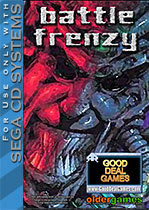 Recently, I spoke to Michael Thomasson, who runs Good Deal Games. A small company based in Hamburg, New York, Good Deal Games is in the business of completing and bringing unreleased prototypes to market. It has released numerous titles for such long-discontinued consoles like the Colecovision, CD-I, and Vectrex. Not content with simply finding and completing lost games, GDG also funds homebrew projects and is always eager to help aspiring developers make their games a reality.
Recently, I spoke to Michael Thomasson, who runs Good Deal Games. A small company based in Hamburg, New York, Good Deal Games is in the business of completing and bringing unreleased prototypes to market. It has released numerous titles for such long-discontinued consoles like the Colecovision, CD-I, and Vectrex. Not content with simply finding and completing lost games, GDG also funds homebrew projects and is always eager to help aspiring developers make their games a reality.
Some of its most prolific support has been for the Sega CD. Already, six titles are available, including Mighty Mighty Missile, which made its debut at this year’s Classic Gaming Expo in San Jose, California. Mr. Thomasson was kind enough to give us some of his time to discuss their efforts to bring new titles to the Sega CD.
Sega-16: You guys have done a great job at keeping old systems alive. This was obviously not accomplished overnight. Exactly how did Good Deal Games come into being?
Michael Thomasson: Well, I used to operate a chain of video game stores known as Let’s Play and LA Videogames. I ran the operation for about three years before beginning my professional career as an animator. Over that course of time, I met many amazing people and fellow collectors. I became friends with many of them and most of them knew of my fanaticism for the hobby and the extent of my rather large personal collection of video games. So, when I left the chain, many knew how to contact me. When they couldn’t chat with me on a daily basis in the stores, they began to bombard my house with calls and my mailbox with letters. Many still wanted to trade or help locating an item, and it simply became too much. So, I went to the store and bought an “HTML For Dummies” book and learned how to make my own web site, made specifically for game trading. It was an attempt to gain some of my free time back. Little did I know that GDG would become the beast that it has become, and now actually consumes even more of my life!
Sega-16: How hard was it to make GDG a reality?
Michael Thomasson: While I have put a great deal of time and love into the organization, it wasn’t difficult in any sense. I feel that with the proper motivation and love, just about anything can become successful in time through endurance.
Sega-16: About how long does it take on average to complete and release a title?
Michael Thomasson: There really isn’t an answer to that particular question. Many of the games that we have released were created by others but were never published. On these titles, we simply licensed them and made them available. There is, of course, more involved than simply licensing, as much needed packaging artwork often needed to be created and actual manufacturing of the games themselves. The game development by the original developers would be thousands of man hours, but our involvement is much less. We would spend a great deal of time tracking down the games, the original developers, and gaining legal permission, et cetera.
Concerning titles that we designed, those take much more time. Often development tools need to be created before we can ever attempt to start making a game. There is of course programming and sprite (artwork) creation and hours upon hours of testing.
Sega-16: It’s a well-known fact that GDG’s first priority is the preservation of the hobby. In light of this, how supportive has the gaming community been to your efforts?
 Michael Thomasson: Good Deal Games has a strong and loyal customer base, and we really appreciate those that support our goal of game preservation. Many of our products actually lose money, but those that do turn out to be profitable allow funding for other projects. We are really kind of renegades concerning a good and healthy business model. Most organizations won’t bother to publish a title that they know will not allow financial gain. That is the primary difference between a company which is profit-minded and an organization such as GDG which simply has a goal to accomplish. The nice thing about publishing new games for classic systems is that there really is no rush. Our titles just become, how do I say it… “more classic!”
Michael Thomasson: Good Deal Games has a strong and loyal customer base, and we really appreciate those that support our goal of game preservation. Many of our products actually lose money, but those that do turn out to be profitable allow funding for other projects. We are really kind of renegades concerning a good and healthy business model. Most organizations won’t bother to publish a title that they know will not allow financial gain. That is the primary difference between a company which is profit-minded and an organization such as GDG which simply has a goal to accomplish. The nice thing about publishing new games for classic systems is that there really is no rush. Our titles just become, how do I say it… “more classic!”
Sega-16: You’ve published quite a few new games for different systems over the last few years. How difficult was it to get the Sega CD games to production as compared to say, the TG-CD or CD-I titles?
Michael Thomasson: The CD-based games are much easier to publish as they are much less expensive to manufacture. Cartridge based games require an enormous amount of labor concerning manufacturing. Chips and boards have to be located, which dozens of years later is not always an easy task. You have soldering involved, and case manufacturing to deal with before reaching a final end product.
Sega-16: Of all the Sega CD games you’ve completed, which was the most difficult to do?
Michael Thomasson: Well, we have been trying to negotiate the rights for Penn & Teller: Smoke and Mirrors for over three years and it still hasn’t reached fruition. So, that title has definitely been the most difficult title to publish as it hasn’t even happened yet!
Sega-16: Tell us a bit about Mighty Mighty Missile. How long was it in production?
Michael Thomasson: Our newest title, Mighty Mighty Missile, was programmed in-house and was by far the most difficult and most fun to complete. Not only is it a new game for the system, but it also pushed the boundaries of the Sega CD as it it moves more sprites/objects per second than any other Sega CD game ever manufactured. And we proudly state that it does it without any slowdown, which was a common problem for such games during the 16-bit era.
Sega-16: Are there any other new Sega CD titles in works? Any 32X Sega CD games?
Michael Thomasson: We are not ready to announce any of our future Sega CD products at this time. While we hope at some point to release a game for the 32X, no projects have been started at this time. The Sega CD market is rather small, and the 32X market is even smaller. The combined market for users with a Genesis, and a Sega CD, and the 32X is even smaller. I doubt that GDG will ever release a title for the Sega CD 32X combo. Of course, I never thought that we would be involved with releasing CD-i games with our sister company Older Games and we are actually pursuing a Game.Com title at the moment, which is extremely obscure, so who knows!
Sega-16: There are still a few other unreleased Sega CD titles floating around, like Indiana Jones & the Fate of Atlantis and Dragon’s Lair II. How hard would it be to obtain the rights to those titles and what exactly would that process entail?
Michael Thomasson: We actually spoke with a gentleman involved with the development of Indiana Jones and the Fate of Atlantis, and he assures us that no actual game coding was completed. So, this title never really existed other than written game design and mentions of early development in trade magazines. Even if the game did exist, I doubt that a small organization like GDG could afford the licensing rights to such franchises as Indiana Jones or Dragon’s Lair.
Sega-16: Recently, there’s been a surge in interest in old games, and companies are once again visiting their classic properties and famous franchises. How do you see the market for classic gaming in the future? Will this interest last?
 Michael Thomasson: Well, classic gaming is certainly growing in popularity. All the major gaming magazines now have “classic” columns. The real question is this: is it a current fad that will pass by or will it grow to even larger proportions? While we hope for the latter, many believe that that the classic fad will eventually pass by and finish its cycle and the market be enjoyed by a few fellow hobbyists. Of course, both scenarios have their advantages and disadvantages. Only time will tell; however, I will state this: As more new systems are created, the classic community grows much larger. This makes the base unit of older consoles in homes growing, as a new console market is shrinking in comparison..
Michael Thomasson: Well, classic gaming is certainly growing in popularity. All the major gaming magazines now have “classic” columns. The real question is this: is it a current fad that will pass by or will it grow to even larger proportions? While we hope for the latter, many believe that that the classic fad will eventually pass by and finish its cycle and the market be enjoyed by a few fellow hobbyists. Of course, both scenarios have their advantages and disadvantages. Only time will tell; however, I will state this: As more new systems are created, the classic community grows much larger. This makes the base unit of older consoles in homes growing, as a new console market is shrinking in comparison..
Sega-16: Finally, what recommendations do you have for aspiring homebrew programmers?
Michael Thomasson: Oh, that is an easy one! Simply contact us and we’ll help you develop your game and even fund and publish it if you’d like. We promote all game development and will help assist any party interested in making something new and wonderful for our aging but beloved vintage gaming consoles!
Sega-16 would like to thank Mr. Thomasson for his time. Check out Good Deal Games at their website and read the full article on their history over at The-Next Level.com.

Recent Comments